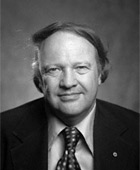Dickey was born in Atlanta, Georgia. After serving as a pilot in the Second World War, he attended Vanderbilt University. Having earned an MA in 1950, Dickey returned to military duty in the Korean War, serving with the US Air Force. Upon return to civilian life Dickey taught at Rice University in Texas and then at the University of Florida. From 1955 to 1961, he worked for advertising agencies in New York and Atlanta. After the publication of his first book, Into the Stone (Middletown, Conn., 1962), he left advertising and began teaching at various colleges and universities. He became poet-in-residence and Carolina Professor of English at the University of South Carolina.
Dickey's third volume, Buckdancer's Choice (Middletown, 1965), won the prestigious National Book Award in Poetry. From 1966 to 1968 he served as poetry consultant to the Library of Congress. In 1977 Dickey read his poem 'The Strength of Fields' at President Carter's inauguration. The Hollywood film of his novel Deliverance (Boston, 1970) brought Dickey fame not normally enjoyed by poets.
Dickey's poems are a mixture of lyricism and narrative. In some volumes the lyricism dominates, while in others the narrative is the focus. The early books, influenced obviously though not slavishly by Theodore Roethke and perhaps Hopkins, are infused with a sense of private anxiety and guilt. Both emotions are called forth most deeply by the memories of a brother who died before Dickey was born ('In the Tree House at Night') and his war experiences ('Drinking From a Helmet'). These early poems generally employ rhyme and metre.
With Buckdancer's Choice, Dickey left traditional formalism behind, developing what he called a 'split-line' technique to vary the rhythm and look of the poem. Some critics argue that by doing so Dickey freed his true poetic voice. Others lament that the lack of formal device led to rhetorical, emotional, and intellectual excess. The truth probably lies somewhere between these two assessments, and it will be left to the reader to decide which phase of Dickey's career is most attractive.
Dickey's most comprehensive volume is The Whole Motion (Hanover, NH, and London, 1992). His early poems are collected in The Early Motion (Middletown, 1981). Recent individual volumes include The Eagle's Mile (Hanover and London, 1990) and Falling, May Day Sermon, and Other Poems (Hanover and London, 1982). Dickey has also published collections of autobiographical essays, Self Interviews (Garden City, NY, 1970; repr. New York, 1984) and Sorties (Garden City, 197 1; repr. New York, 1984).
From The Oxford Companion to Twentieth-century Poetry in English. Ed. Ian Hamilton. Oxford: Oxford University Press, 1994. Copyright © 1994 by Oxford University Press. |






